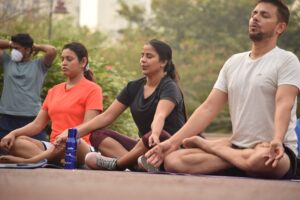Group therapy can be a great way for people in addiction recovery and substance use disorder therapy to achieve long-term sobriety by providing a supportive and structured environment to work through their recovery journey with others in similar situations. Unlike individual therapy, group therapy settings foster a sense of community, allowing participants to share experiences, gain insight from others, develop interpersonal skills, and reduce feelings of shame.
Structured group activities help people at all stages of recovery by reinforcing coping strategies, improving emotional regulation, and building confidence in navigating recovery. These activities foster accountability and encourage open communication, making therapy sessions more effective.

Benefits of Group Therapy for Addiction Recovery: 10 Common Group Therapy Topics
People in addiction recovery benefit from not just individual therapy but also group therapy, as it provides a unique opportunity for shared learning, peer support, and social reinforcement. Group formats allow people to hear different perspectives, practice communication skills, and develop problem-solving techniques in a supportive setting. Additionally, they can help participants feel less isolated and more motivated by seeing others succeed in their recovery journey.
- Sense of Community: Reduces isolation and fosters connections with others on similar paths.
- Accountability: Encourages participants to stay committed to their recovery journey.
- Skill Development: Builds coping mechanisms, social skills, and emotional resilience.
- Safe Environment: Provides a non-judgmental space to express thoughts and emotions.
Group therapy also provides a supportive space for individuals to explore personal challenges, develop coping skills, and build meaningful connections. Different themes and activities help participants navigate emotional growth, relationship dynamics, and personal development. Facilitators will consider the group’s composition, experiences, and comfort levels when selecting activities to foster engagement and meaningful discussion. The following topics and exercises illustrate common group therapy approaches that aim to promote healing, self-awareness, and resilience in a group therapy setting.
1. Family Dynamics
Understanding family relationships and their impact on personal growth is crucial in therapy. Family dynamics shape communication styles, emotional responses, and conflict-resolution strategies.
Exercise: Group members discuss their family backgrounds and identify patterns that have influenced their relationships and self-perception. Facilitators may provide psychoeducation regarding common family dynamics then help guide a discussion on how to set boundaries, improve communication, and heal from past family conflicts.
Goal: Foster self-awareness and provide strategies for improving family relationships.
2. Relationships
Healthy relationships are essential for emotional well-being. Many individuals struggle with trust, communication, and vulnerability in their relationships.
Exercise: Members share experiences regarding past or current relationships, exploring themes of trust, attachment, and boundaries. Facilitators may encourage role-playing exercises to help practice healthy communication techniques and elicit feedback from fellow group participants.
Goal: Enhance relationship skills and promote emotional intelligence.
3. Conflict, Trust, and Forgiveness
Conflict is inevitable, but learning to navigate it effectively can lead to growth. Trust and forgiveness play key roles in personal and relational healing.
Exercise: Participants identify conflicts they have experienced and discuss how they managed them. Facilitators help participants explore the role of trust in conflict resolution and strategies for healthy forgiveness and work together to build new communication skills.
Goal: Develop conflict resolution skills and promote emotional healing.
4. Fellowship and Spirituality
Connecting with others and exploring personal beliefs can provide strength and a sense of purpose. Fellowship groups are often peer-led, and common examples include Alcoholics Anonymous, Narcotics Anonymous, SMART Recovery, and Celebrate Recovery. These may be religious or secular.
Exercise: Members share personal experiences about their recovery. These may include discussions related to how spirituality or personal beliefs impact their recovery. The group discusses ways to incorporate meaningful practices into daily life.
Goal: Encourage self-reflection and foster a sense of connection and support.
5. Navigating Successful Adulthood
Individuals with substance use disorders may struggle with completing tasks associated with managing their responsibilities, including developing healthy routines, educational and career goals, budgeting, paying taxes, managing credit and insurance, and many other challenges.
Exercise: The facilitator provides psychoeducation regarding life skills, coping strategies, and community resources. Members discuss common struggles, share successes, and practice applying new skills.
Goal: Equip participants with tools to navigate adult responsibilities confidently.
6. Holistic Wellness
Mental, physical, and emotional health are interconnected. A balanced approach to wellness supports overall well-being.
Exercise: Group members explore aspects of wellness, such as nutrition, exercise, sleep, and mental health. This may include practicing yoga, meditation, or group exercises. Participants may also work on developing plans for nutrition, wellness, and self-care.
Goal: Promote a holistic approach to self-care and well-being.
7. Emotions
Recognizing and managing emotions is fundamental to mental health. Understanding emotional triggers can lead to healthier coping mechanisms.
Exercise: The facilitator helps patients learn to identify different emotions and introduces techniques for emotional regulation and resilience. Members participate in an emotion-identification exercise, sharing how different emotions manifest in their lives.
Goal: Enhance emotional awareness and coping strategies.
8. Relapse Prevention
Recognizing personal risk factors and developing strategies to maintain progress is vital for long-term success.
Exercise: Participants create individualized relapse prevention plans, identifying triggers and warning signs. Role-playing scenarios can help reinforce coping strategies.
Goal: Strengthen resilience and equip members with tools to maintain progress.
9. Planning for the Future
Setting goals and creating actionable steps toward personal growth fosters motivation and direction.
Exercise: Members set short-term and long-term goals, discussing potential obstacles and ways to overcome them. The group provides support and accountability.
Goal: Encourage goal-setting and future-oriented thinking.
10. Trauma
Addressing past trauma in a safe and supportive environment is essential for healing.
Exercise: Group members discuss their experiences with trauma in a way that feels comfortable for them. Techniques for processing emotions and developing coping strategies are explored.
Goal: Provide a supportive space for healing and resilience-building.
9 Engaging Group Therapy Activities for Substance Use Disorder Recovery
Different types of activities achieve different goals in substance use disorder recovery. Some exercises focus on emotional expression, while others aim to build practical coping skills and resilience. Facilitators should consider the group’s composition, experiences, and comfort levels when selecting activities to make sure the group feels comfortable and empowered to participate and engage.
Here are nine effective group therapy exercises:
1. Triggers and Coping Strategies Discussion
Understanding triggers and developing coping strategies is essential for long-term recovery. Many people in recovery face challenges related to stress, social situations, and past trauma, which can lead to a setback if not properly addressed.
- Exercise: Group members identify common triggers and discuss past experiences where they successfully navigated or struggled with these challenges. The facilitator guides a discussion on different coping strategies, emphasizing the importance of replacing unhealthy responses with productive coping mechanisms.
- Goal: Increase self-awareness and develop effective, personalized coping skills.
2. Relapse Prevention Planning
Creating a prevention to avoid a setback provides individuals with a structured approach to maintaining sobriety. Understanding personal risk factors and proactively addressing them can prevent setbacks.
- Exercise: Members create individualized setback prevention plans with input from the group. Discussions focus on identifying high-risk situations, recognizing warning signs, and role-playing effective strategies for handling them.
- Goal: Equip participants with actionable steps to maintain long-term sobriety and build resilience against relapse triggers.
3. Journaling and Reflection Exercise
Journaling allows individuals to process their emotions, recognize patterns, and track progress over time. Reflection encourages growth by helping individuals acknowledge their successes and learn from past struggles.
- Exercise: Members write about past challenges in recovery, reflecting on their emotional responses and the lessons learned. Volunteers share their reflections, allowing the group to discuss different perspectives on overcoming obstacles.
- Goal: Promote self-reflection, enhance emotional processing, and encourage tracking personal progress.
4. Role-Playing Scenarios
Practicing real-life situations in a safe environment helps build confidence and prepare individuals for future challenges. Role-playing encourages problem-solving and allows participants to refine their communication skills.
- Exercise: Members practice handling difficult situations, such as refusing a drink, dealing with peer pressure, or addressing a personal trigger. The facilitator provides constructive feedback and alternative approaches for effective responses.
- Goal: Build confidence and reinforce healthy decision-making in real-life recovery challenges.
5. Gratitude and Strength Sharing
Fostering a mindset of gratitude can shift focus from negative experiences to positive progress. Recognizing personal strengths and achievements reinforces motivation for continued recovery.
- Exercise: Participants list aspects of their recovery journey they are grateful for and discuss the impact of gratitude on their mental health and sobriety. The group explores ways to incorporate gratitude practices into daily routines.
- Goal: Encourage positivity, reinforce motivation for sobriety, and promote emotional well-being.

6. 12-Step and Support Group Integration
Connecting with support groups like Alcoholics Anonymous (AA) or Narcotics Anonymous (NA) can provide long-term guidance and peer encouragement. Understanding the principles of these programs helps individuals determine if they are a good fit for their recovery journey.
- Exercise: Discussion on the principles of 12-step programs and their role in recovery. Participants share experiences with support groups such as AA and NA, discussing challenges and benefits.
- Goal: Provide education on external recovery resources and encourage engagement with peer support networks.
7. Guided Meditation and Mindfulness Practice
Mindfulness techniques help individuals manage stress, reduce cravings, and increase emotional awareness. Learning to be present in the moment allows for better decision-making and improved emotional regulation.
- Exercise: The group participates in a guided meditation session focused on stress reduction, emotional regulation, and mindfulness techniques. A discussion follows on how mindfulness can help manage cravings and emotional distress.
- Goal: Teach relaxation techniques to improve emotional regulation and support long-term sobriety.
8. Healthy Relationship and Communication Workshop
Building healthy relationships and maintaining open communication are critical for recovery. Learning to set boundaries and express emotions in a constructive way fosters better personal and professional relationships.
- Exercise: Role-playing exercises help participants practice assertive communication, setting boundaries, and rebuilding trust with loved ones. The group explores strategies for navigating conflicts healthily and productively.
- Goal: Strengthen interpersonal skills, develop healthier relationships, and improve emotional intelligence.
9. Creative Expression Activity
Creative activities like art, music, and writing provide an emotional outlet for individuals in recovery. Expressing thoughts and feelings in nonverbal ways can be therapeutic and aid in emotional healing.
- Exercise: Members engage in artistic outlets such as painting, music, or creative writing to express emotions. A group discussion follows, highlighting how creative expression aids in emotional healing and stress management.
- Goal: Encourage self-expression, alternative coping strategies, and emotional processing.
Implementing Effective Group Therapy Sessions
Facilitators should experiment with different exercises to determine which works best for various group dynamics and personality types. Some people may benefit more from reflective activities like journaling, while others may thrive in interactive discussions or role-playing scenarios. Encouraging open dialogue during sessions helps participants feel heard and valued, fostering deeper engagement.
Integrating these exercises into existing therapy sessions should be done thoughtfully, ensuring a balance between structure and flexibility to accommodate different comfort levels. Key strategies for effective sessions include:
- Creating a Safe Space: Establish ground rules for confidentiality and respect.
- Encouraging Participation: Use a variety of activities to accommodate different comfort levels.
- Adapting to Group Needs: Modify exercises based on group dynamics and individual progress.
Building Support and Skills Through Group Therapy
Group therapy is a powerful tool in addiction recovery, providing people with support, accountability, and essential coping skills. By incorporating structured activities, facilitators can create a more engaging and beneficial experience for participants. If you or a loved one needs support during recovery, call Buena Vista Recovery at (480) 685-9011 or contact us to get the support you need.
CHANDLER
3033 South Arizona Avenue
Chandler, Arizona 85248
TUCSON
5151 East Pima Road
Tucson, Arizona 85712
SCOTTSDALE
8171 E Indian Bend Rd
Scottsdale, AZ 85250






